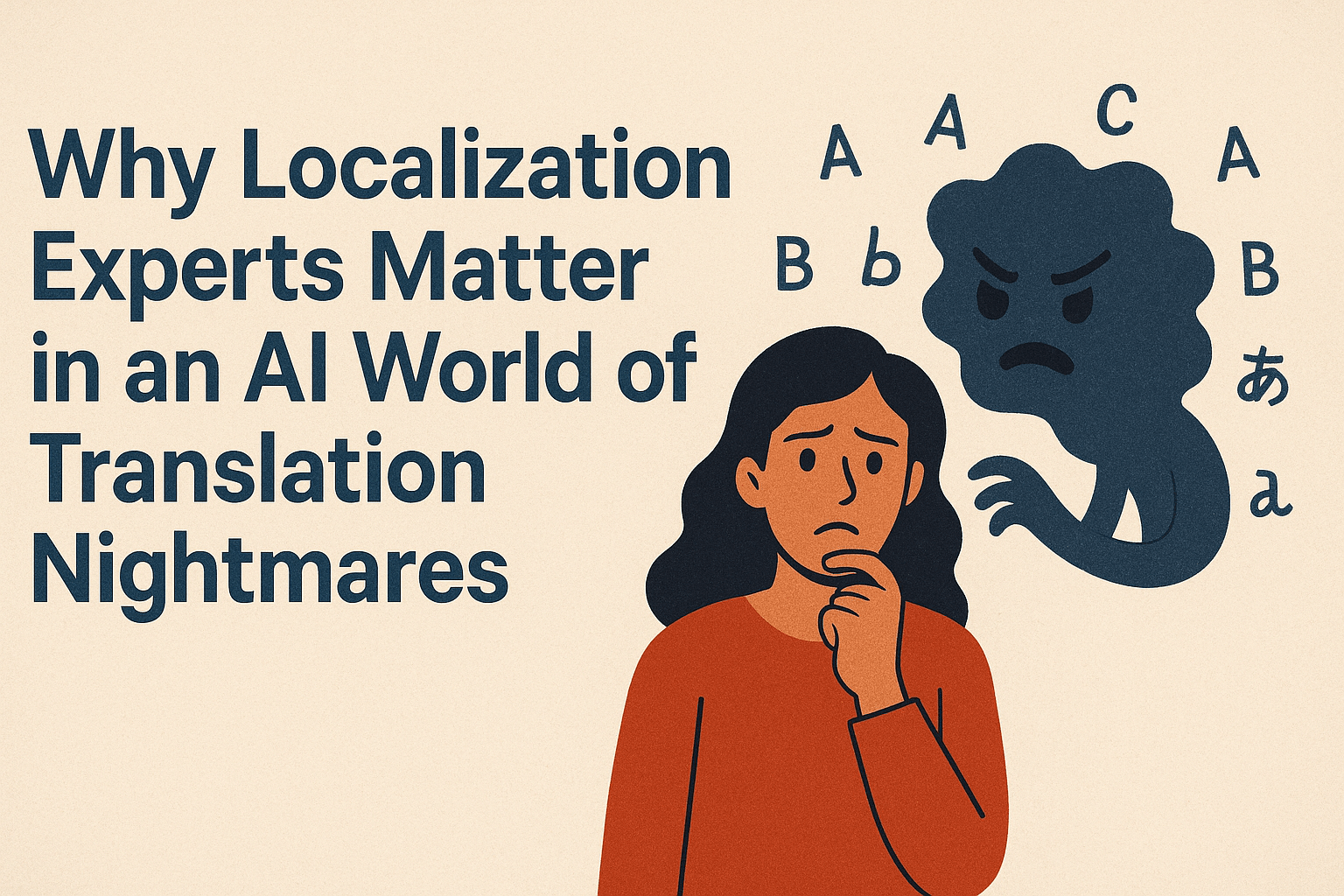
Why Localization Experts Matter in an AI World of Translation Nightmares
We’re entering the spooky season. No, not Halloween, but a time when businesses and organizations are becoming overreliant on artificial intelligence (AI) for their localization projects. While fast turnaround times and cost savings get pulses racing with excitement, it’s a significant risk for the heart-stopping horrors of poor AI localization.
The Risks of AI Localization
Localization is more than merely a word-for-word translation—it’s an adaptation of content to align with the cultural and linguistic nuances of a specific audience. The fact is, AI localization offers many benefits to translation, but is also capable of making some bone-chilling errors—from bland messaging to perpetuating biases.
Does the thought of bad localization make your skin crawl? Keep reading to learn five issues of AI localization and avoid the nightmare of these costly missteps.
3 Dangers of AI Localization
AI offers a meaningful advantage to businesses and organizations connecting with a global audience, but treating it as a replacement for localization experts, rather than a tool, can produce frightful results.
1. Inaccuracies
One of the main challenges with AI translations and localizations is that they struggle with cultural nuances. This holds particularly true for content intended to engage audiences emotionally—for example, when Apple updated Siri’s French Canadian variant to say “Allô” instead of the more formal and Eurocentric “Bonjour.” A small change like this can have a big impact on your audience—in this case, the nearly 11 million Canadians who can converse in French. However, it requires experts intimately familiar with the language and culture.
Despite the example above, AI is at its best when translating commonly spoken languages like French, Spanish, and Italian. It struggles with less common languages with less data to train on, such as Finnish, Pashto, and Hindi. Yes, Hindi! Despite being one of the most widely spoken languages in the world, high-quality Hindi content remains surprisingly scarce online, since English is used extensively for everything from business to government communication.
Another hair-raising issue with AI localization is hallucinations. Like a ghost in your favorite scary movie, AI hallucinations can confidently generate content that feels correct, but is totally false, or even worse, culturally insensitive. How scary is that?
2. Blah Voice and Messaging
AI-generated translations tend to follow predictable patterns, making them inherently repetitive. This is a gravely serious problem, especially for marketers trying to stand apart from the competition or connect with customers. AI localization often produces generic-sounding, boring content that fails to capture a company or organization’s unique voice or the societal norms of a particular market.
In the end, successful localization isn’t just translation—it’s about making the content feel native to the market’s culture.
3. Injecting Bias and Sterotypes
Great localization embeds content into a market’s cultural framework—however, bad AI localization can make content feel foreign and out of place at best and offensive at worst. AI software is only as good as the data it’s trained on, and if that data contains biases or stereotypes, its outputs will reflect them and likely have grave consequences.
A common issue with AI localization is with languages like Spanish, French, and German, where every noun aligns with a gender. For example, in Spanish, “doctor” is doctor (male) or doctora (female), but many AI models default to male pronouns, which can introduce gender bias, reinforce stereotypes, and alienate audiences.
Inserting bias is just one ghastly surprise AI localization can have for unsuspecting businesses and organizations. AI-generated content with racial stereotypes and prejudice can offend audiences and undermine localization efforts.
Other Unsettling Issues with AI Localization
In addition to the challenges of AI localization presented above, there are some more sinister ways it can creep up on you and put your company or organization at risk.
Security Risks
There is no standard for how AI translation tools protect your data. In fact, many AI translation tools store, process, and train their models using imputed data. For some businesses, this can expose their sensitive, private, and/or proprietary knowledge to everything from data leaks to hackers to simply being spit out by a chatbot.
The stakes are especially ominous for professionals in regulated fields—healthcare, legal services, and education—where mismanaging sensitive information can have serious repercussions. Using AI localization in these industries could cause non-compliance with HIPAA or FERPA, harm your reputation, undermine trust, or trigger fines and penalties.
Disrupt Workflows
The promise of near-instantaneous translations and cost-cutting is alluring, but like a plot twist in your favorite spooky story, poorly implemented AI localization can create more work and cancel out savings.
Implementing AI localization without a well-planned strategy or proper integration with existing tools can reduce efficiency, forcing linguists to spend time correcting errors instead of optimizing content for specific regions.
The Role of AI in Localization
AI isn’t replacing professions in localization; however, it’s reshaping their roles. AI is reducing the time experts spend on basic translations and creating first drafts and letting them focus on the aspects of localization that matter most:
- Adapting content for local culture
- Understanding social and political nuance
- Handling sensitive material
- Safeguarding consistent brand voice
- Ensuring terminology is clear and consistent
- Catching errors that machines don’t
Ultimately, AI is a tool helping localization experts produce even more powerful and culturally relevant content for global audiences.
Translations ABC
For 35+ years, Translations ABC has been providing businesses and organizations with exceptional translation services, from technical translations to localization to proofreading and editing. Over that time, we’ve built a reputation as one of the most respected translation agencies in the nation thanks to our high-quality translations and exceptional customer service.
Translations ABC provides multilingual services in more than 200 languages across business, healthcare, education, and more. Whether it’s a large localization project, a single transcription, or anything in between, you can trust Translations ABC to deliver the human touch to your translations.
